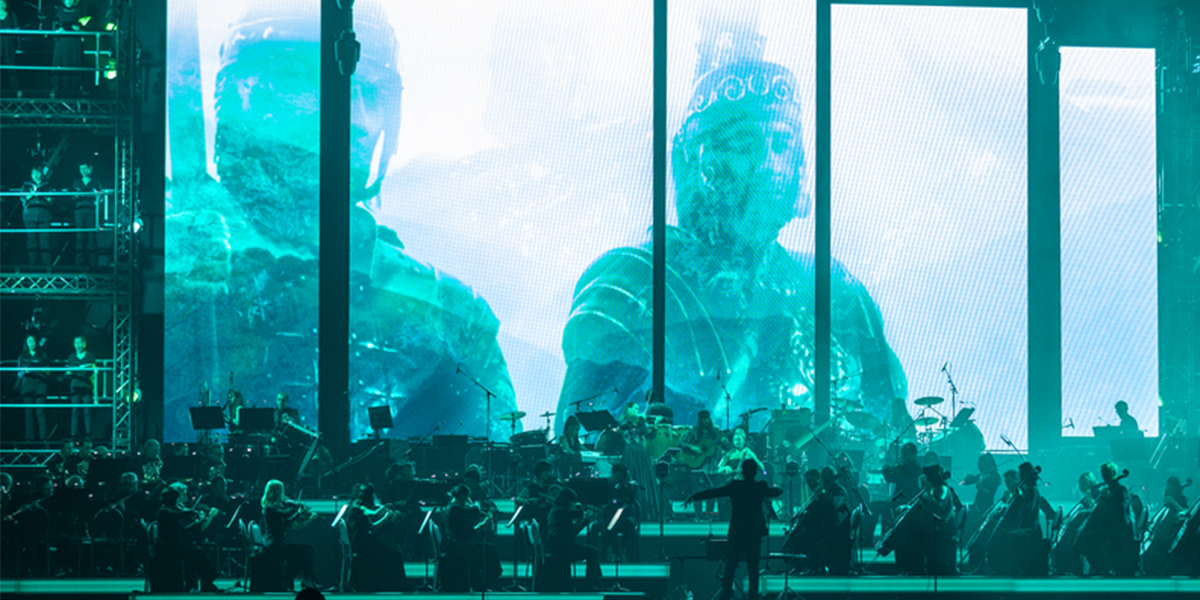Revenge-Concertgoing Boosts Europe’s Live Events

Hans Zimmer © Petrhajek [License via Dreamstme]
This is the summer of blockbuster music tours. Just as “revenge travel” saw tourists hellbent on traveling post-pandemic, “revenge concertgoing” is packing Europe’s outdoor live events, arenas and stadiums. It’s a post-pandemic boom for live events, boosted by some of the world’s biggest entertainers who have emerged with post-pandemic projects.
And it’s not just the rock stars. For example, the movie composer behind “Interstellar” and “Gladiator” is selling out arenas. Ecstatic crowds in Spain, Slovakia and Germany have catapulted Hans Zimmer into the top 25 touring artists on the latest Bloomberg Pop Star Power Rankings. In May, he sold 101,255 tickets for $10,531,521 (according to Pollstar), making his tour one of the month’s biggest.
Zimmer travels with a 38-piece orchestra and band, dazzling lights, a gigantic disco ball and two large screens, leveraging the impact of video and imagery related to the films. He talks between tracks, adding those fan baits known as “behind-the-scenes” stories.
The live event resurgence surprised industry experts. They expected an incremental return to live events (similar to trade shows which may take three years to return to pre-COVID audience levels).
Instead, we’ve burst into an intense era of live events.
The music industry is holding its breath as it expects to see an A-grade artist with the first $1 billion-ticket global concert tour. The revenue from Elton John’s Farewell Yellow Brick Road tour already reached $887 million — currently the highest-grossing tour of all time and Elton isn’t done counting yet. The tour began in 2018 and just ended in Stockholm on July 8.
The previous record-holder for highest-grossing tour, Ed Sheeran’s “Divide” (2017-19), hit $776 million. Pre-pandemic, of course.
Speaking of Stockholm, the city confirms the impact on the national economy of today’s event tours by A-list musicians and the revenge concertgoers.
After Beyoncé performed her “Renaissance” tour in Stockholm this May, a Danske Bank economist calculated ticket sales — as well as hotel and restaurant revenues — added 0.2-0.3% to Swedish inflation that month.
Beyoncé performed in Stockholm twice in May. The global “BeyHive” (the singer’s fans) buzzed into both shows to take advantage of weak Swedish currency and cheaper ticket prices (compared to other countries). Driven by Ticketmaster’s exorbitant prices (seats were hundreds of dollars cheaper than comparable ones in U.S. cities), even some Americans found it more viable to fly to Stockholm to catch the show.
Visit Stockholm, the official tourism promotion agency owned by the City of Stockholm, told The Washington Post visitors from the U.S., Germany, and Britain took the most bookings in the city.
The agency attributed the high levels of tourism and overloaded hotel occupancy to the “Beyoncé effect.” One press called even it trickle-down “Beyoncéconomics.”
Either way, it points to this summer’s impact of revenge concertgoing — and it fortunately renews the proof of the economic value which live events bring to a city or national venue.
Revenge is sweet, after all.




